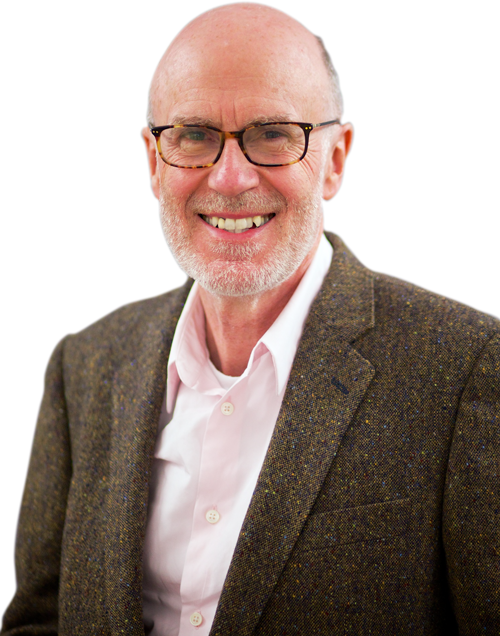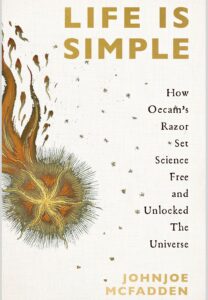Biologist & Writer

Upcoming Talks
Coming Soon
Talks about my latest book, Life is Simple!

Sunday 19th September, 2021, How the Light Gets In festival, Kenwood, Hampstead, London
10.30 am A Solus talk at 10.30am on How to keep life simple
Sunday 19th September, 2021, Wimbledon Bookfest, Wimbledon, London
3 – 4pm on William on William of Occam and his razor in science, life and the universe
Thursday 7th October, The Royal Institution, 7.00pm to 8.30pm, Online
Life is Simple: How William of Occam and his razor changed science forever.
………………………………………………………………………………………………………………………………………………………….
National Science Foundation Workshop. Quantum Biology and Quantum Processes in Biology. Alexandria, VA, November 25 – 27, 2018. Talks from this workshop, including mine, can be found here.
Beyond Center Workshop on the Physics of Living Matter, Quantum Criticality and the Secret Electric Life of Cells, Tempe, Arizona, November 5-7, 2018.
Quantum Biology. PhD Day. Fundación Centro Nacional de Investigaciones Cardiovasculares Carlos III (CNIC). 24th November, 2017.
QuICC SUMMER SCHOOL 2018. Quantum Information, Computing and Control
13th to 17th August 2018, University of York.
Quantum Biology, Biomat 2018, Granada, June, 20-22, 2018.
Berwins Salon North: Past, Present and Future, Harrogate, 24 May, 2018
Life on the Edge: The Future of Quantum Biology. Worlds of Entanglement Symposium, Free University of Brussels (VUB), Brussels, Belgium, September 29–30, 2017.
Super Human You in a Super Human World: Gene Editing, Robotics and Ethics. with Prof Johnjoe McFadden (Surrey) & Dr Alasdair Russell (CRISPR) and Dr Catherine Pendegrass (UCL) icw. Helen Bagnall (SALON LONDON). Hospital Club, London, WC2. Wednesday 20th September 2017.
Life on the Edge: 1st QST International Symposium “Quantum Life Science. Tokyo Bay Makuhari Hall, Chiba, Japan, 25 – 26th July, 2017.
Latitude Festival.The SpeakEasy
Salon London: Gene Editing: the Future of You. with Prof Johnjoe McFadden (Surrey) & Dr Alasdair Russell (CRISPR) and Dr Catherine Pendegrass (UCL) icw. Helen Bagnall (SALON LONDON) Sunday 16th July, 2017.
Monday, 23 February, 7.30pm, 2015, Cafe Scientifique, The Tea Bar, 9-13 London Street, Basingstoke.
Life on the Edge: How quantum mechanics keeps us alive
Recent research has discovered that weird quantum effects such as quantum tunnelling, quantum coherence or entanglement, may underpin fundamental biological processes, such as photosynthesis, enzyme action, gene mutation or even avian navigation. This talk and discussion will explore these recent findings and discuss what they mean for our understanding of what life really is.
Tuesday 24 February, 2015 , 7.00pm to 8.30pm,Royal Institute
Quantum Biology: Does life depend on quantum mechanics?
Quantum mechanics is still a controversial and, to some, counter-intuitive theory and does not have widespread acceptance even within the scientific community. And yet, more and more research is going into how this theory may be applied to the biological world.
In the second of three guest-curated events by Jim Al-Khalili, Johnjoe McFadden and Hans Westerhoff will debate the merits of quantum biology and whether it has any significance to our world.
Sunday 12 April 2015, 7pm, Edinburgh Science Festival
Did life originate in the quantum multiverse? Johnjoe Mcfadden and Jim Al-Khalili
The origin of life is one of the biggest problems in the whole of science. The simplest living organisms alive today are actually highly complex creatures that could not have arisen by chance chemical reactions taking place in some ‘primordial soup’ billions of years ago. They must have been preceded by simpler self-replicating systems, probably self-replicating RNA or proteins. But even these are very improbable structure that again were unlikely to have arisen by chance, at least in a single classical universe.
In this talk we will discuss our proposal that the first biomolecules existed in a state of quantum superposition of trillions of interchangeable forms able to perform a quantum search to find rare self-replicating states. Life dipped into the quantum multiverse to make the first self-replicator.
Thursday 14th May, Computing with Nature, Small Exhibition Space, First Floor, Great North Museum: Hancock, Newcastle University.
Quantum Computing with Nature
All computations are instantiated by physical systems that interact according to physical laws to perform calculations. But which physical laws? The bits of all conventional computers are composed of trillions of elementary bits – fundamental particles – so their behaviour is subject to classical laws, such as Newton’s laws of mechanics or the various electrical laws. However, since Feynman’s insight it has been recognized that a vastly more powerful form of computation exists, quantum computing, that computes with fundamental particles and their interactions via qubits.
Living systems do of course compute using classical laws but recent revolutionary findings indicate that, a molecular level, they also compute also using quantum laws and thereby take advantage of the huge computational capabilities of quantum computing. For example, the first step in photosynthesis, the transfer of the energy captured from a photon to the reaction centre, takes advantage of quantum coherence to calculate the fastest and most efficient route to reaction centre and thereby achieve energy transport efficiencies close to 100%, greater than any artificial process. Enzymes and, possibly, olfactory receptors utilize quantum tunnelling to optimize catalysis and molecular recognition; and birds appear to use quantum entanglement to help them navigate across the globe. In this talk I will discuss the potential applications of quantum biology for the building of synthetic life forms.
Monday 25 May 2015, 7pm, Hay Book Festival
Life on the Edge: How quantum mechanics keeps us alive. Johnjoe McFadden and Jim Al-Khalili
Recent research has discovered that weird quantum effects such as quantum tunnelling, quantum coherence or entanglement, may underpin fundamental biological processes, such as photosynthesis, enzyme action, gene mutation or even avian navigation. This talk and discussion will explore these recent findings and discuss what they mean for our understanding of what life really is.
Sun 7 Jun 2015 4:00pm – 5:00pm, The Times Cheltenham Science Festival
Quantum Biology. Johnjoe McFadden and Jim Al-Khalili
The strange theory of quantum mechanics – where tiny particles behave in extraordinary, counter-intuitive ways – is fundamental to chemistry and physics, but could it also be fundamental to biology too? Physicists Jim Al-Khalili and Johnjoe McFadden give us an update on what’s new and exciting in the fast moving field of quantum biology and the role it plays in the natural world.
Sunday 11 October. William Morris Tent, Wimbledon Common, 5pm. Tickets, £12.50
Quantum Biology: How Life Exists. Johnjoe McFadden and Jim Al-Khalili
The mystery of how life exists has not yet been explained. However developments in quantum mechanics could provide the final explanatory spark. Professors Johnjoe McFadden and Jim Al-KhaliliOBE will vividly communicate the explosive new field of quantum biology and attempt to answer the biggest puzzle of all: what is life? Johnjoe McFadden is professor of molecular genetics at the University of Surrey and Jim Al-Khalili is an academic, author and presenter of Radio 4’s The Life Scientific. Their book, Life on the Edge: The Coming of Age of Quantum Biology has recently been nominated for the 2015 Royal Society Winton Prize.
Tickets can be purchased online at www.wimbledonbookfest.org or via the box office on 020 8545 8342 (Tuesday 10am-5pm, Fridays 2-5pm).
November 26th, 2015, International School on Quantum and Nano Computing Systems and Applications, Dayalbagh, Agra, India.
Life on the Edge: How quantum mechanics keeps us alive. Johnjoe McFadden
Recent research has discovered that weird quantum effects such as quantum tunnelling, quantum coherence or entanglement, may underpin fundamental biological processes, such as photosynthesis, enzyme action, gene mutation or even avian navigation. This talk and discussion will explore these recent findings and discuss what they mean for our understanding of what life really is.